Simplifying developer tooling
Redesigning the developer activation experience resulting in 54% increase in customer retention
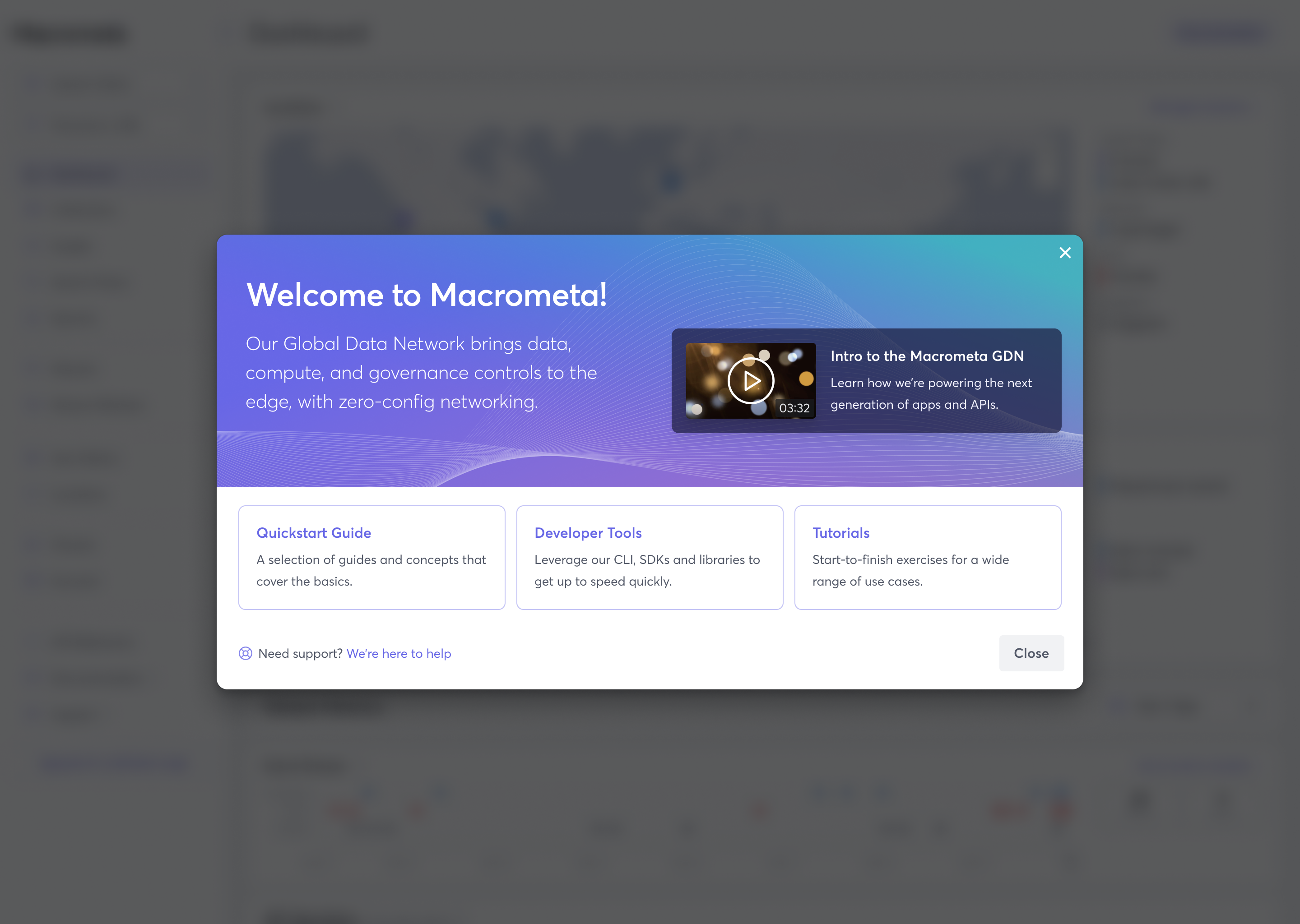
Macrometa
Macrometa is a cloud development solution that empowers developers to solve the most challenging operational problems with ready-to-go industry solutions. Accelerating business outcomes with real-time, low-latency enterprise apps, APIs, and web services that optimize customer experiences, monetization, and operations.
As a product designer on the team, I worked specifically on the entire redesign of the solution focusing on user onboarding and continuous activation. In collaboration with our head of product, head of design and engineers. In a span of 3 months.
How might we provide a solution enabling developers of all experience levels build applications and achieve their goals with ease?
My Discovery Process
I personally led our initial research effort involving:
This was an eye opening experience as the pain points spanned across various features and our documentations and guides. I was able to identify and understand the challenges they were facing a lot better after this process..

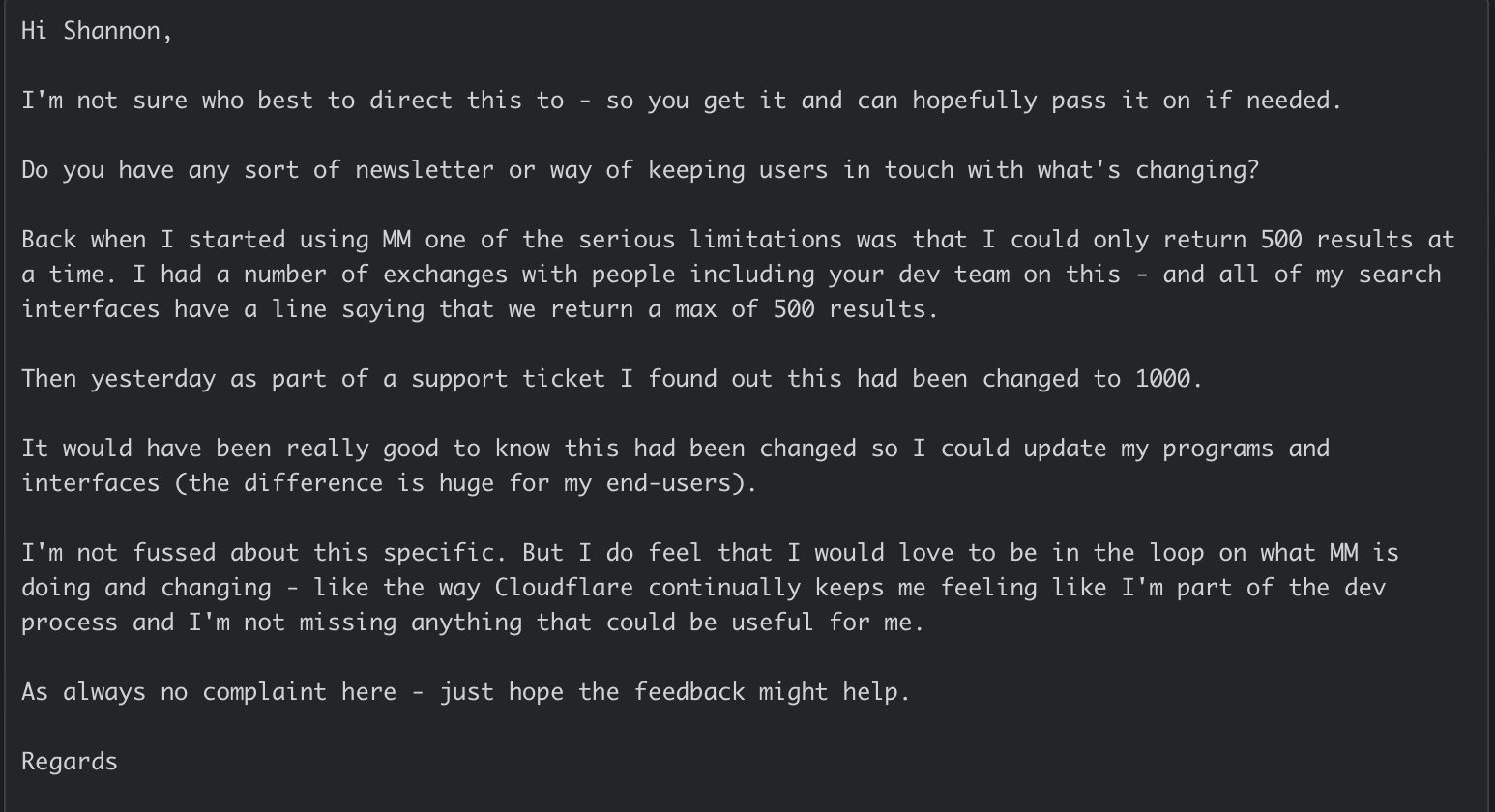
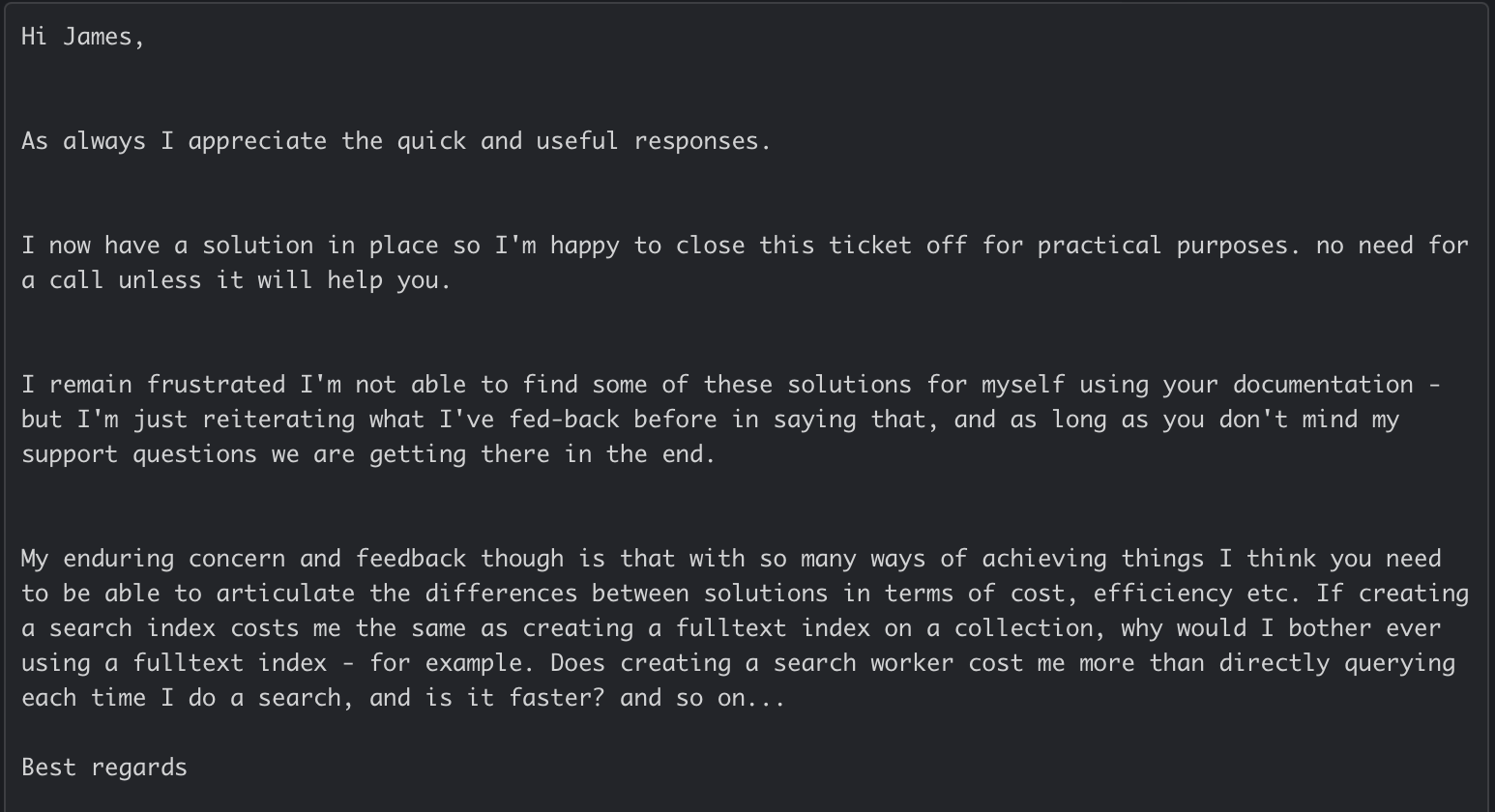
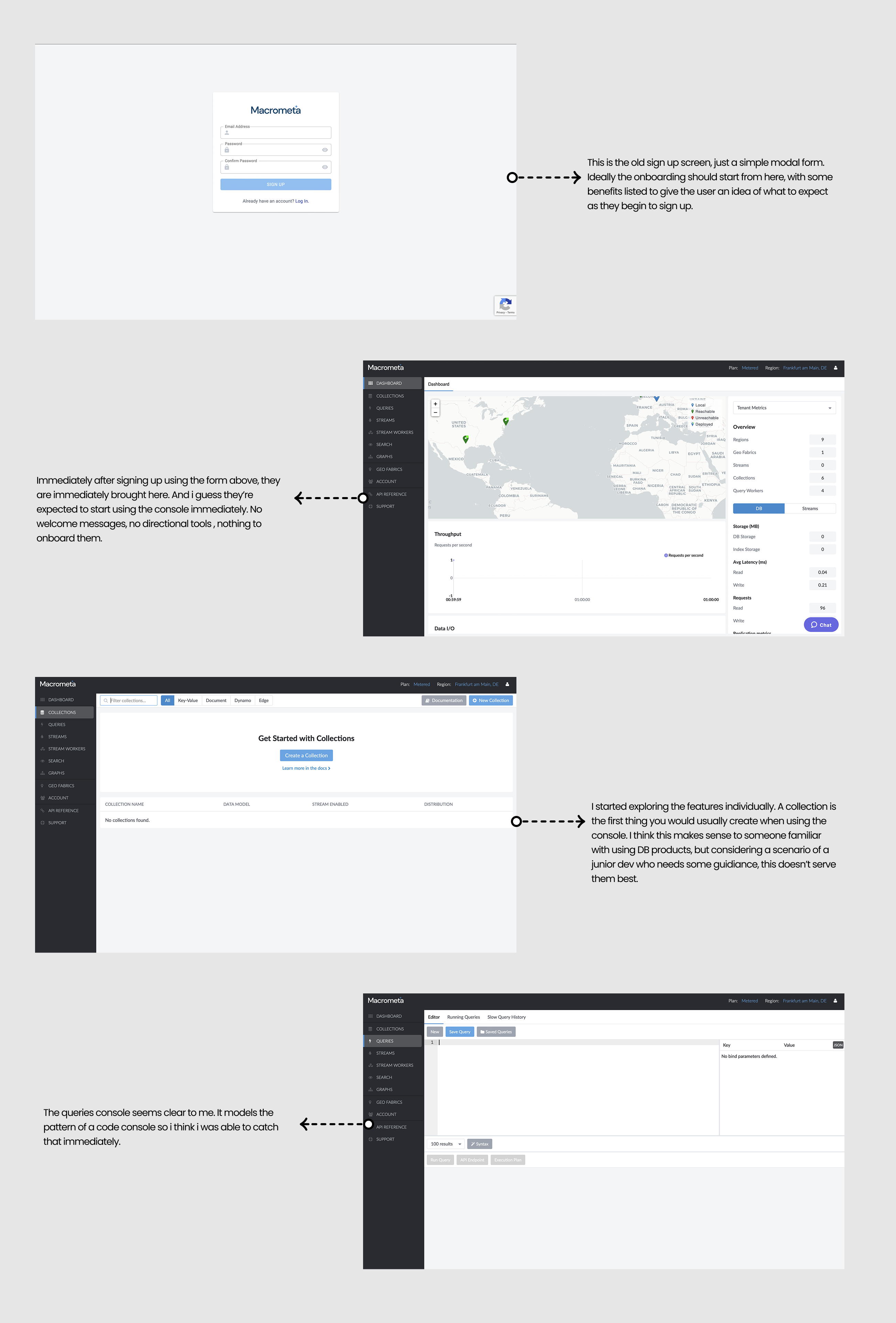
I was opportuned to speak to quite a number of developers (users) and it was interesting to see their unique needs and thought processes. 70% of macrometa is made up of developers , so they were also a great point of resource during this process.
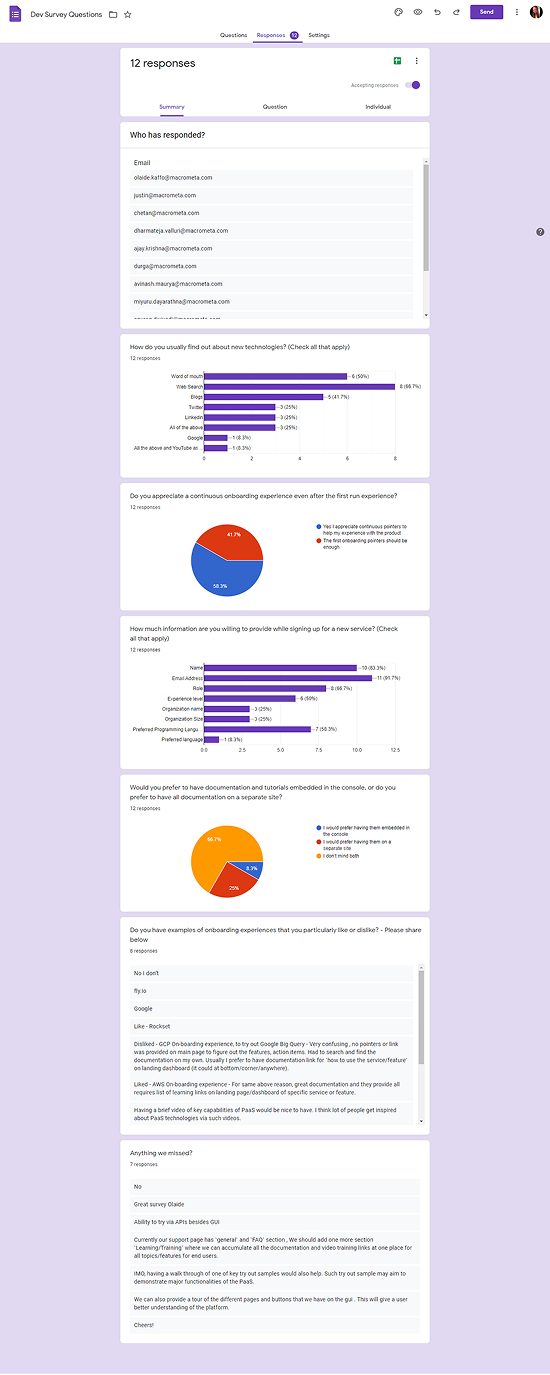
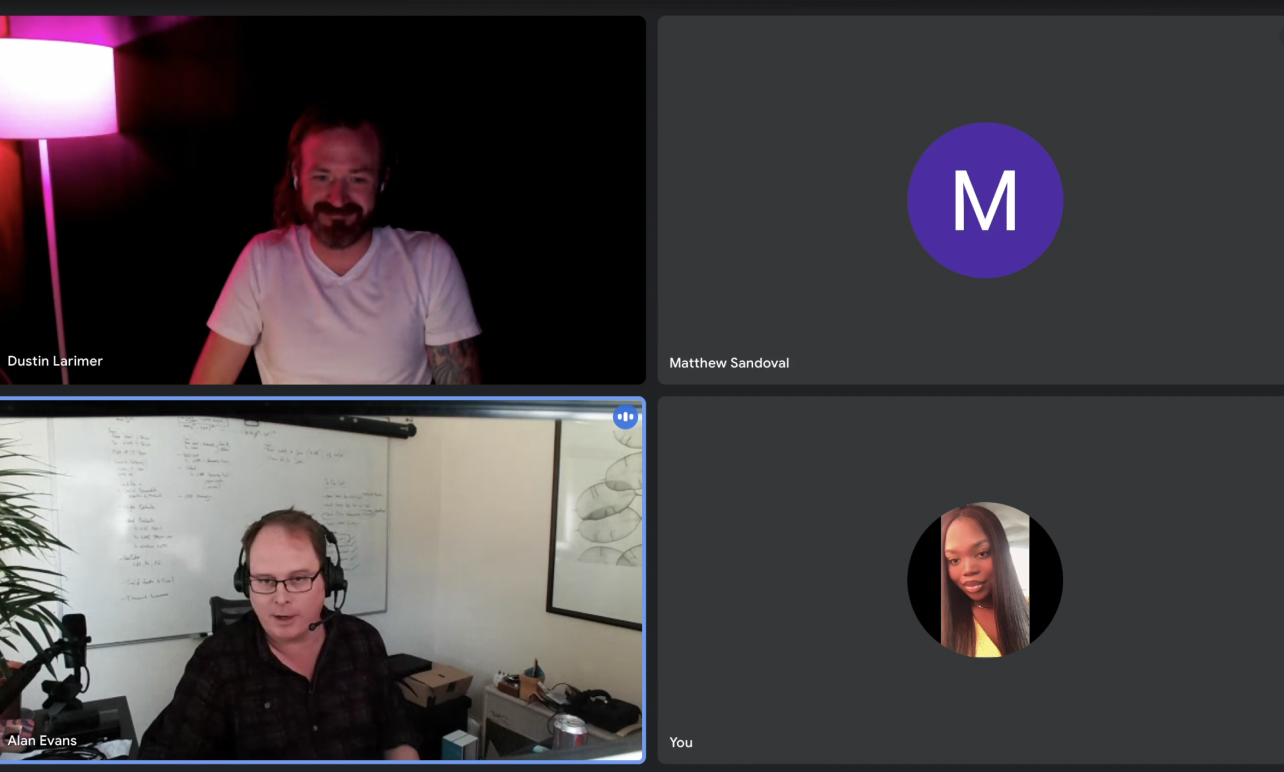
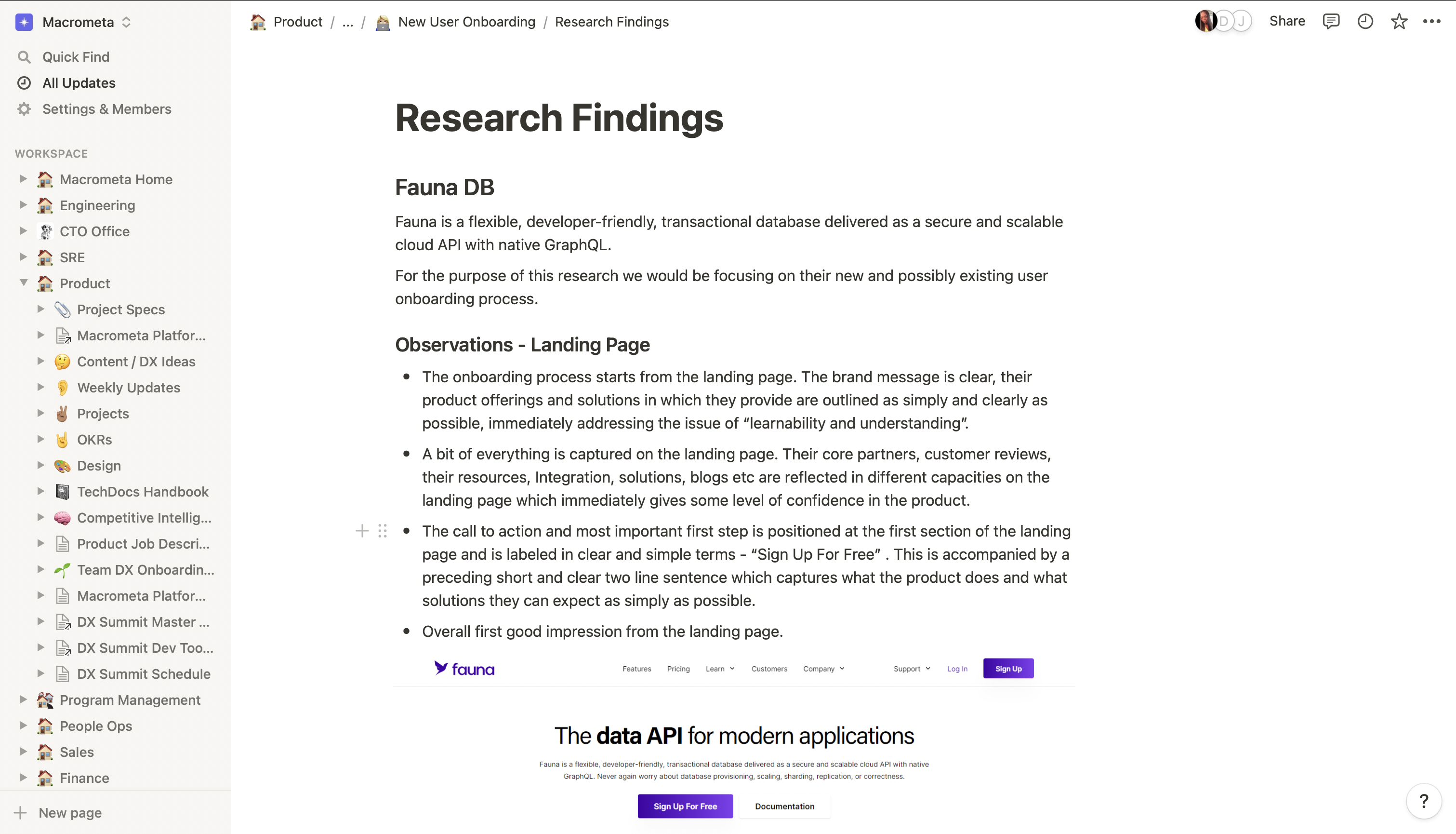
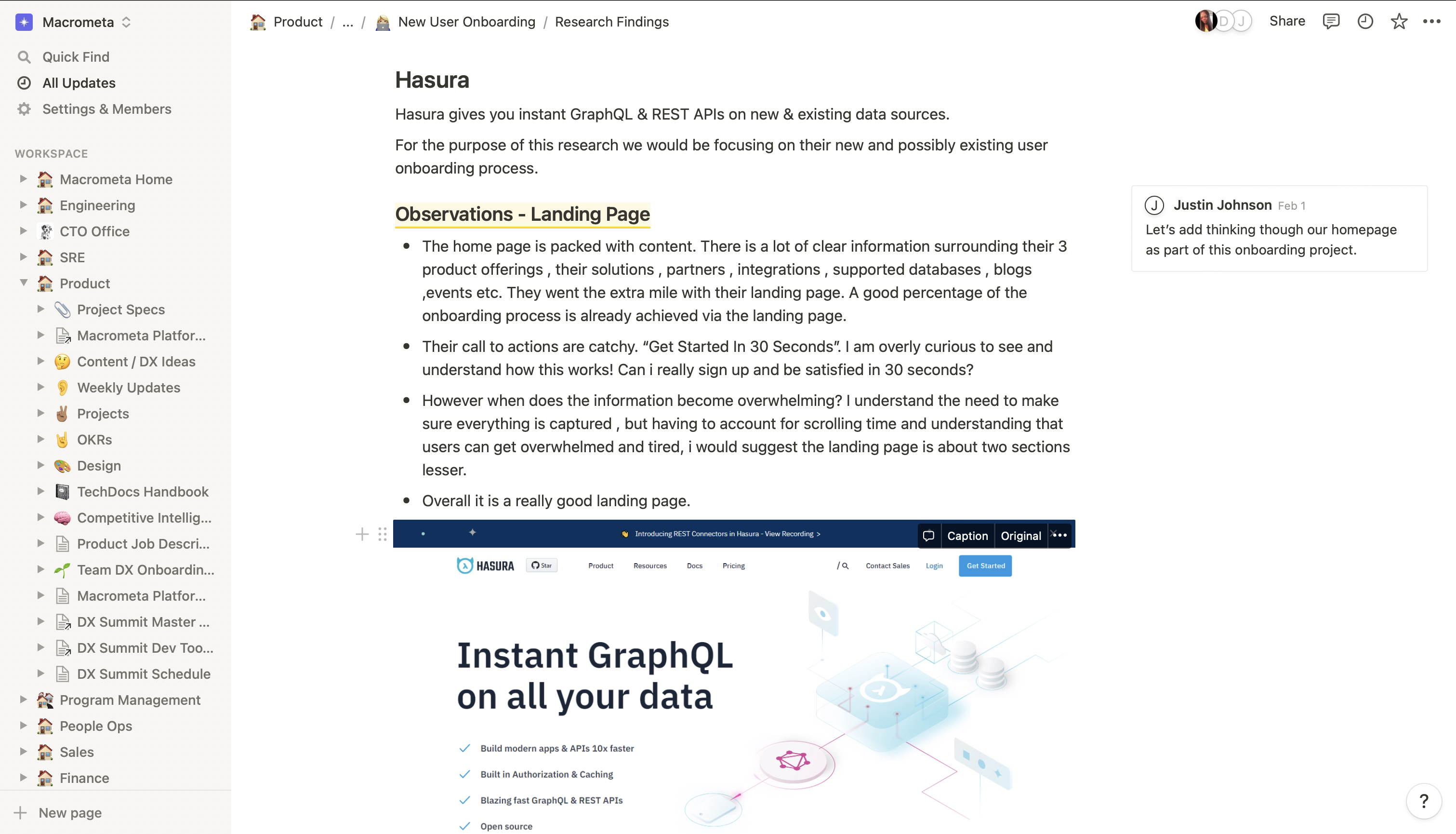
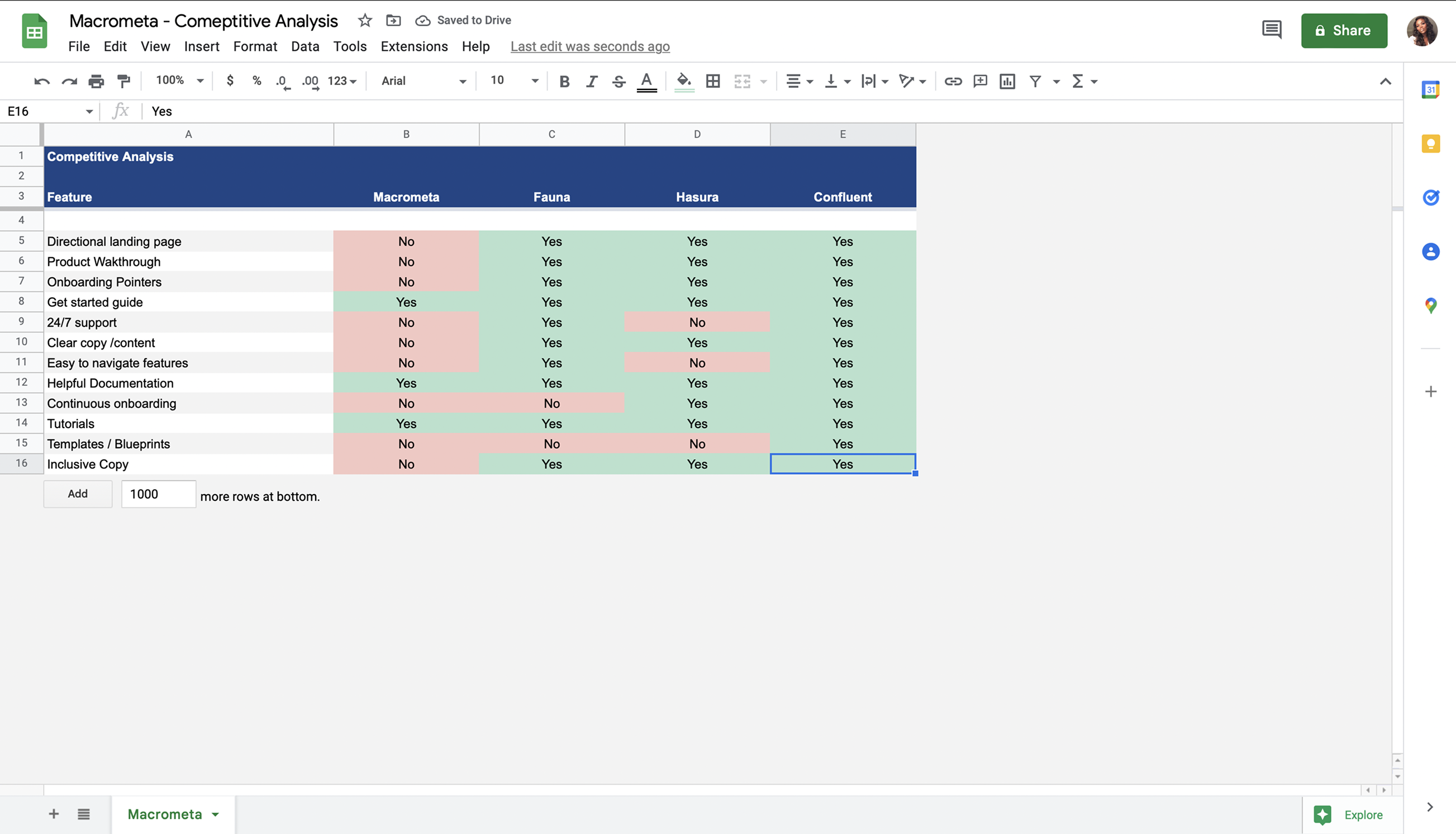
Key Insights I discovered
Through careful synthesis of all research data, I identified four key insights that were consistent across organizations:
Onboarding & ActivationThe current solution did not have any proper onboarding flow. Hence no productive first time experience
Experience level considerationNo available tutorials, templates or guides to accommodate developers of all experience levels.
Visual & User ExperienceThe current solution lacked greatly in visual consistency and there was plenty room for UX improvements
Meet The Users
Based on my research findings, I developed two primary user personas that represented stakeholders across various organizations:

Alex, Engineering Manager
Engineering Manager, mid sized company

Tom, Junior Software Engineer
Entry level, new startup
Design Process
Based on the goals , painpoints and actions defined for the various user personas, i tailored my design process to ensure all of their individual needs are met.
User Journeys & Flows
I began to rethink the user journey from encountering the product , to checking out our website and eventually getting started. I iterated on these a few times as i had to collaborate with product , marketing and sales to identify what they believe needed to be incorporated
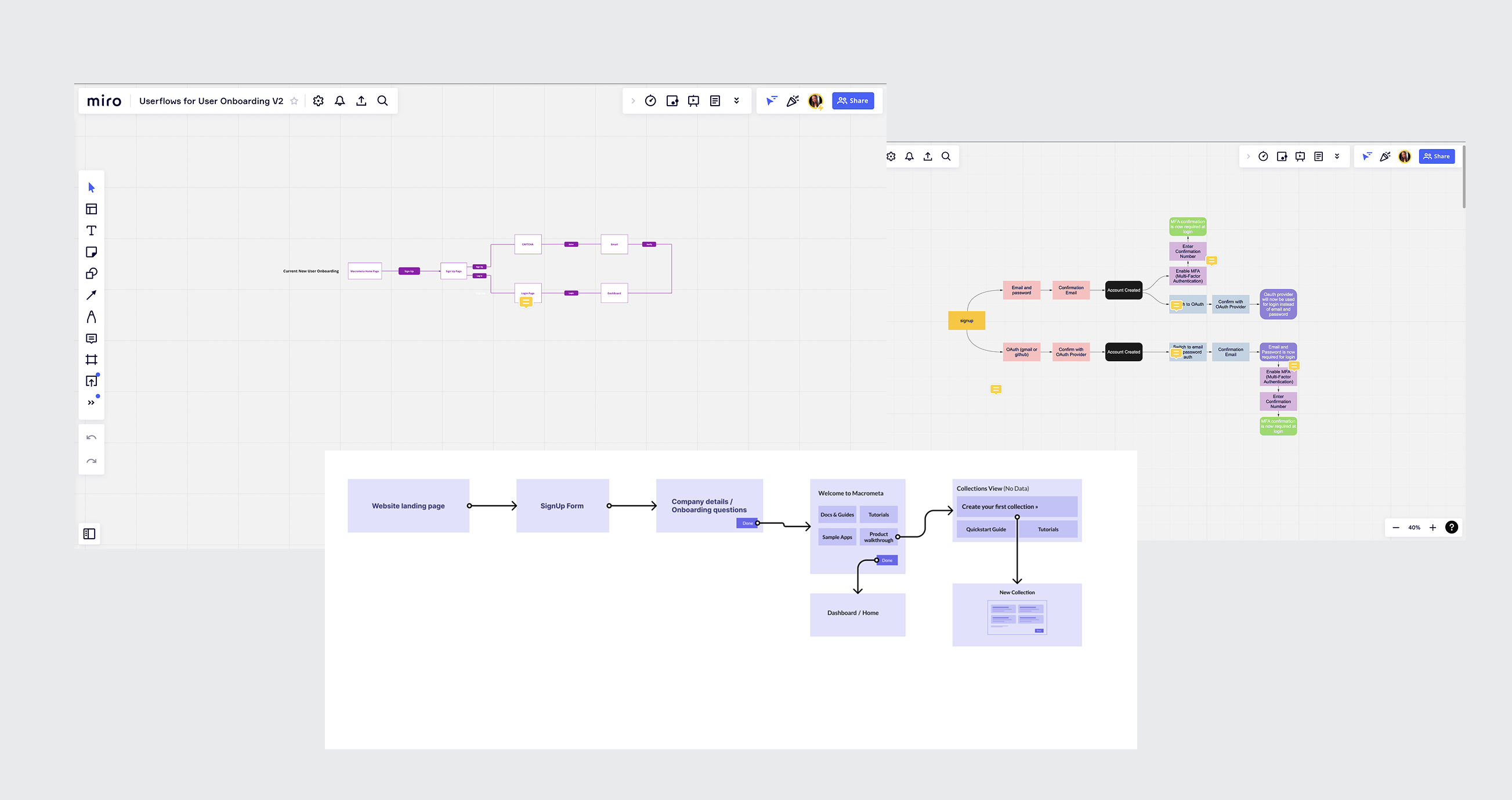
Design Solutions
After several iterations and feedback from the internal team and prospective users via user testing sessions, here are the design solutions i came up with for our V1 Solution.
User Testing & Iterations
I conducted usability tests on key interaction patterns with 15 developers across different experience levels :
Attached below are some testimonials gotten from the user testing session participants and actual customers.
“
The industry-specific compliance templates saved us 6 months of development time for our fintech platform. The visual workflow made complex deployments feel as simple as using a mobile app.
Lead Developer, Financial Services
“
After years of fighting with AWS's confusing dashboards, this platform felt like stepping into the future. My junior developers could understand and manage deployments on day one.
DevOps Manager, E-commerce Platform
“
We reduced our application latency from 200ms to 8ms globally, which directly translated to a 23% increase in user engagement. But honestly, the visual interface made our entire team actually enjoy working with edge infrastructure for the first time."
CTO, Gaming Company
Business Impact I Delivered
Results delivered After 12 months of platform use
User Experience & Operational Efficiency
72%reduction in support tickets sent
87%Increase in sales leads generated
$2.3Mannual recurring Revenue generated
80%increase in user satisfaction feedback.
ROI Summary I Delivered For My Organization
$2.3M revenue in year one
$47,000customer acquisition cost per organization
$220,000customer lifetime value per organization
82%increase in customer retention
Key Design Decisions & Rationale
Industry-Specific Visual Templates
RationaleGeneric configuration screens required extensive customization; visual templates with industry-specific layouts reduced complexity.
ImpactReduced time-to-production from weeks to days, enabled premium pricing model, 85% of customers adopted template-based approach
Consumer-Grade Visual Polish
RationaleDeveloper tools traditionally had poor visual design; applying consumer app design standards created emotional engagement
Impact40% improvement in user satisfaction scores, became talking point in sales demonstrations, influenced buying decisions at C-level.
Visual-First Architecture Over CLI-Only
RationaleWhile 84% of developers preferred command-line tools for efficiency, 91% expressed frustration with existing platforms' lack of visual feedback and poor user experience
Impact73% faster user onboarding, became primary differentiator against CLI-heavy competitors, enabled broader market adoption beyond senior developers
Conclusion
This project demonstrated that successful B2B developer tooling requires deep understanding of technical workflows combined with business impact focus. By prioritizing developer experience while delivering measurable business outcomes, I created a platform that not only solved immediate technical challenges but also enabled new business models and growth opportunities for our customers.
Simplifying developer tooling
Redesigning the developer activation experience resulting in 54% increase in customer retention

Macrometa
Macrometa is a cloud development solution that empowers developers to solve the most challenging operational problems with ready-to-go industry solutions. Accelerating business outcomes with real-time, low-latency enterprise apps, APIs, and web services that optimize customer experiences, monetization, and operations.
As a product designer on the team, I worked specifically on the entire redesign of the solution focusing on user onboarding and continuous activation. In collaboration with our head of product, head of design and engineers. In a span of 3 months.
How might we provide a solution enabling developers of all experience levels build applications and achieve their goals with ease?
My Discovery Process
I personally led our initial research effort involving:
This was an eye opening experience as the pain points spanned across various features and our documentations and guides. I was able to identify and understand the challenges they were facing a lot better after this process..




I was opportuned to speak to quite a number of developers (users) and it was interesting to see their unique needs and thought processes. 70% of macrometa is made up of developers , so they were also a great point of resource during this process.




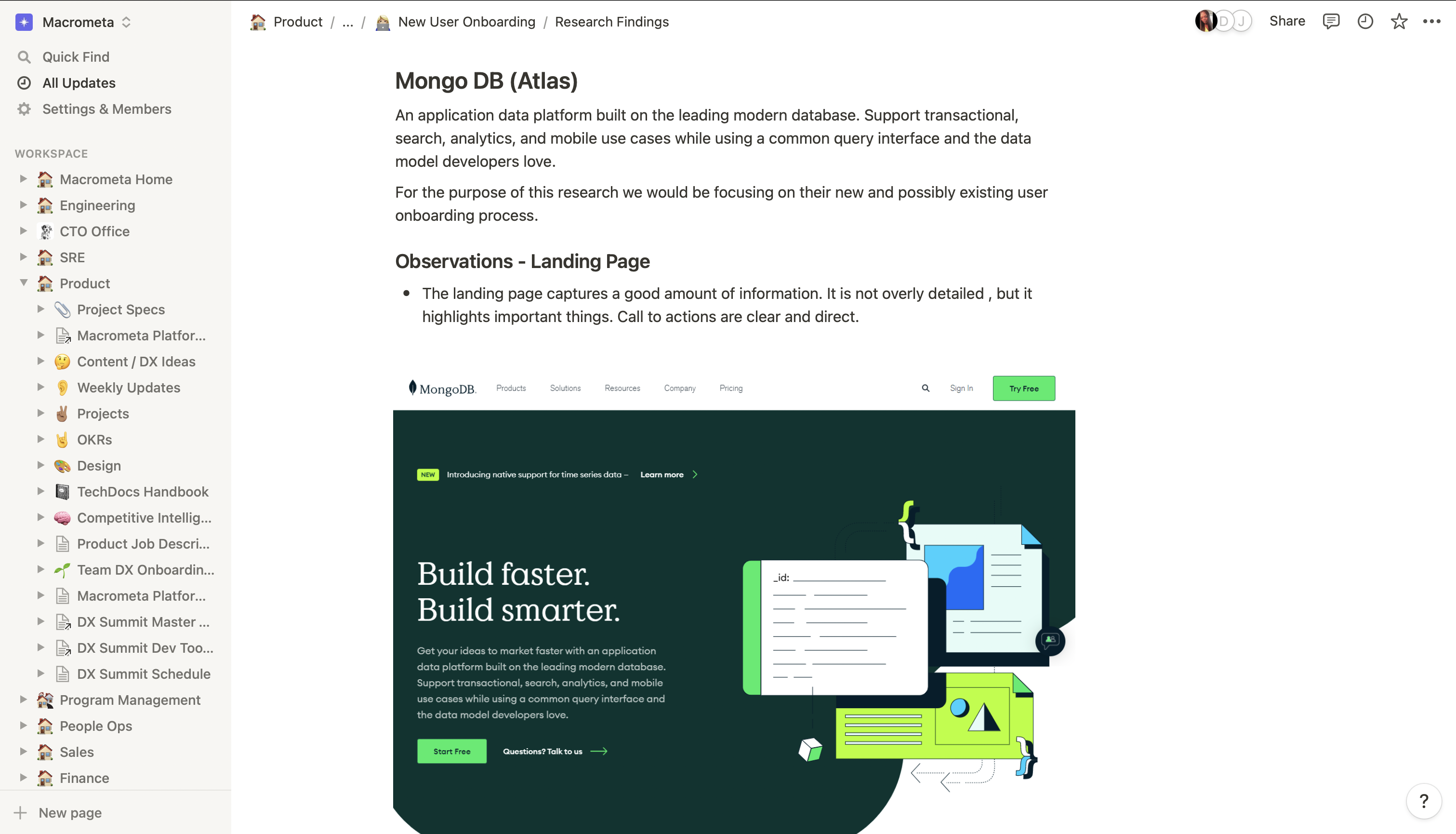
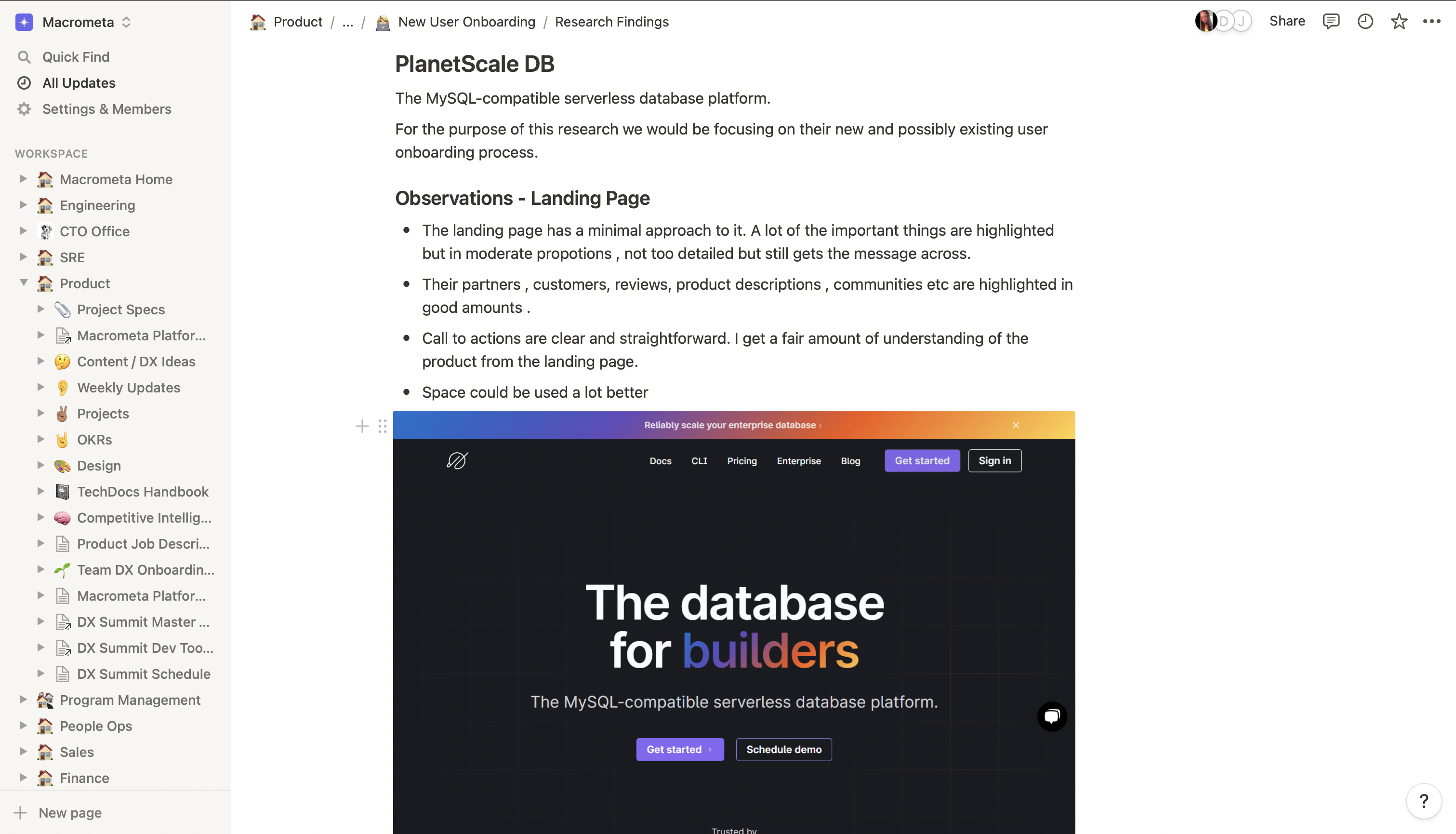

Key Insights I discovered
Through careful synthesis of all research data, I identified four key insights that were consistent across organizations:
Onboarding & ActivationThe current solution did not have any proper onboarding flow. Hence no productive first time experience
Experience level considerationNo available tutorials, templates or guides to accommodate developers of all experience levels.
Visual & User ExperienceThe current solution lacked greatly in visual consistency and there was plenty room for UX improvements
Meet The Users
Based on my research findings, I developed two primary user personas that represented stakeholders across various organizations:

Alex, Engineering Manager
Engineering Manager, mid sized company
"I am constantly looking for the best developer tooling solutions to help my team produce quality work in minimal time"
GoalsFind high quality and easy to use developer tools for the entire development team.
PainpointsHighly priced solutions, not a lot of easy to navigate products, needs to properly allocate resources.

Tom, Junior Software Engineer
Entry level, new startup
“I am just starting out my software development career, I need a tool that provides as much support as possible.”
GoalsComplete development tasks in little to no time. Produce high quality work even as a junior.
PainpointsStruggling to find easy tutorials and guidance for developer tooling solutions currently existing.
Design Process
Based on the goals , painpoints and actions defined for the various user personas, i tailored my design process to ensure all of their individual needs are met.
User Journeys & Flows
I began to rethink the user journey from encountering the product , to checking out our website and eventually getting started. I iterated on these a few times as i had to collaborate with product , marketing and sales to identify what they believe needed to be incorporated

Design Solutions
After several iterations and feedback from the internal team and prospective users via user testing sessions, here are the design solutions i came up with for our V1 Solution.
User Testing & Iterations
I conducted usability tests on key interaction patterns with 15 developers across different experience levels :
Attached below are some testimonials gotten from the user testing session participants and actual customers.
“
The industry-specific compliance templates saved us 6 months of development time for our fintech platform. The visual workflow made complex deployments feel as simple as using a mobile app.
Lead Developer, Financial Services
“
After years of fighting with AWS's confusing dashboards, this platform felt like stepping into the future. My junior developers could understand and manage deployments on day one.
DevOps Manager, E-commerce Platform
“
We reduced our application latency from 200ms to 8ms globally, which directly translated to a 23% increase in user engagement. But honestly, the visual interface made our entire team actually enjoy working with edge infrastructure for the first time."
CTO, Gaming Company
Business Impact I Delivered
Results delivered After 12 months of platform use
User Experience & Operational Efficiency
72%reduction in support tickets sent
87%Increase in sales leads generated
$2.3Mannual recurring revenue generated
80%increase in user satisfaction feedback.
ROI Summary I Delivered For My Organization
$2.3M revenue in year one
$47,000customer acquisition cost per organization
$220,000customer lifetime value per organization
82%increase in customer retention
Key Design Decisions & Rationale
Industry-Specific Visual Templates
RationaleGeneric configuration screens required extensive customization; visual templates with industry-specific layouts reduced complexity.
ImpactReduced time-to-production from weeks to days, enabled premium pricing model, 85% of customers adopted template-based approach
Consumer-Grade Visual Polish
RationaleDeveloper tools traditionally had poor visual design; applying consumer app design standards created emotional engagement
Impact40% improvement in user satisfaction scores, became talking point in sales demonstrations, influenced buying decisions at C-level.
Visual-First Architecture Over CLI-Only
RationaleWhile 84% of developers preferred command-line tools for efficiency, 91% expressed frustration with existing platforms' lack of visual feedback and poor user experience
Impact73% faster user onboarding, became primary differentiator against CLI-heavy competitors, enabled broader market adoption beyond senior developers
Conclusion
This project demonstrated that successful B2B developer tooling requires deep understanding of technical workflows combined with business impact focus. By prioritizing developer experience while delivering measurable business outcomes, I created a platform that not only solved immediate technical challenges but also enabled new business models and growth opportunities for our customers.